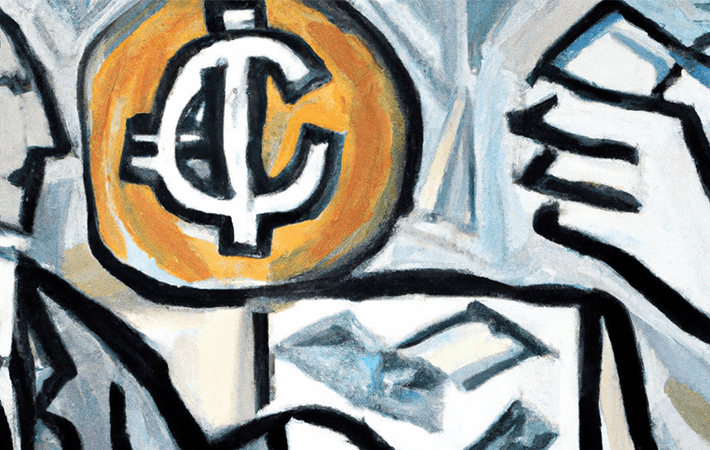“Currency trading”
Image extraction: DALL・E2
It’s been about a year and a half since I started in early 2022. I’ve been contributing to BTC. A fixed amount is automatically withdrawn from my Japanese yen bank account every month, and Bitcoin is purchased. I’m using a service for this, so I don’t really feel it, but it’s certainly happening every month. In other words, I am using the yen-cost averaging method to regularly invest in Bitcoin against the Japanese Yen.
Effectiveness as a Measure Against Yen Depreciation
I’d like to say that it’s effective as a measure against the recent depreciation of the yen, but in reality, I hardly feel it. It’s because the monthly contribution amount is too low. To begin with, if you want to take measures against yen depreciation, you should just normally buy foreign currency (fiat). Anyway, I think the contribution should be made in an amount that is not burdensome, but if it’s so little that you don’t feel it, then it doesn’t have much meaning. Being too timid and shrinking back is also not good. Therefore, I am considering increasing the monthly contribution amount. It depends on the BTCJPY chart, though.
Disadvantages of Dollar-Cost Averaging/Index Investing
The disadvantages would be that it’s hard to feel its effectiveness, it’s boring because there’s nothing to do, and it doesn’t lead to learning about investing. I personally agree with this. If you are also speculating in FX or individual stocks, you might especially feel this way. People who witnessed the crypto frenzy around 2017 would probably feel the same. However, there are not a few people who see these disadvantages as advantages. Having nothing to do means it doesn’t take your time, and not feeling its effectiveness means it doesn’t consume your attention, allowing you to focus on other things. After all, the vast majority lose when it comes to investment, so it may be better to maintain some distance from it.
…As I write this, I think there are quite a few people, if not most, who would consider these points as merits rather than demerits.
Dollar-Cost Averaging/Index Investing is Essentially Defensive
Investing at regular intervals, little by little, is ultimately an act of ‘defense’ aimed at protecting assets, and it can’t be anything more than that. When it comes to regular investment, popular ETFs like Orca are commonly considered investment destinations. Buying such low-risk stocks bit by bit is nothing but defensive investing. Index investing, which aims to mimic the price movement of indices like the S&P 500, is also naturally defensive. For offense, one should speculate in individual stocks, or perhaps in foreign exchange or cryptocurrencies.
What About Investing in Bitcoin through Dollar-Cost Averaging?
So what about buying Bitcoin, which is still considered a high-risk asset, using such a defensive investing style? I also think it can’t be a defensive investment in the conventional sense. If the goal is simply to protect assets, one should probably invest in popular ETFs or gold. Still, I continue to buy BTC in small amounts, thinking that it is not much different from converting Japanese yen to foreign currencies like the US dollar. In other words, I believe that crypto has a future. Although it takes the form of regular investing, in my own perception, it’s just like buying foreign currency. It’s an exchange.
Anyway, if you don’t believe that Bitcoin and other cryptocurrencies will continue to become more widely adopted globally, then it’s not something you should be doing. It’s a natural conclusion, though.
For that reason, I’m considering increasing the amount of my regular investment depending on the charts. Although the theory behind regular investing is to consistently put in a fixed amount without worrying about highs and lows, my thinking is closer to aiming for the best possible rate when exchanging currency.
The Potential of Bitcoin
To be honest, I haven’t felt that cryptocurrencies are particularly useful or convenient at this point. There are some instances where I use the MetaMask app to make purchases with ETH, but even then, there didn’t seem to be a compelling reason that the payment had to be made in crypto. While it might be relatively easy for the seller to handle, as a user, it would have been fine for me whether the payment method was a credit card or PayPal. Currently, it is just one of the many payment methods available and isn’t particularly more convenient than others. This is strictly from the perspective of a consumer. In any case, it’s not something that is absolutely necessary.
Nevertheless, the reason I think crypto will continue to exist is that there’s no reason for it to disappear. It’s not about replacing fiat currencies or anything like that. In the case of Ethereum, it should continue to exist as one of the payment methods; as for Bitcoin, it should continue to exist as a sort of electronic version of gold—whether that existence is modest or not, I don’t know.
Just as the CD that emerged as an alternative to tape recorders has evolved into streaming, I feel that, compared to fiat, crypto has relatively more room to adjust to external factors, or the evolving technology surrounding money.
So, in the long run, crypto or something like crypto, or something that evolves from crypto, is likely to prosper. The true usefulness of Bitcoin, which represents crypto, lies there. That’s why I believe Bitcoin has potential, incorporating all of this into consideration.
Considering that the point of investment is to prepare for the future, in some sense, dollar-cost averaging into BTC could be seen as a sufficiently defensive investment. …Although most people probably wouldn’t agree with that.



